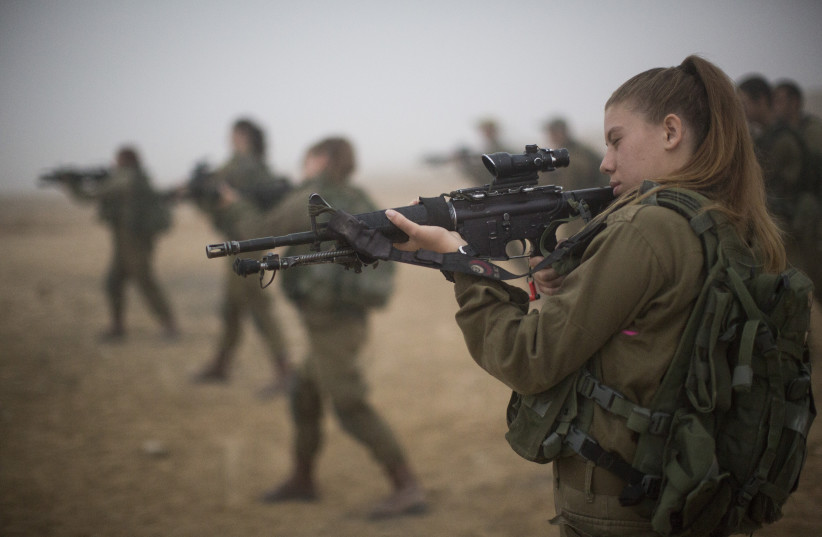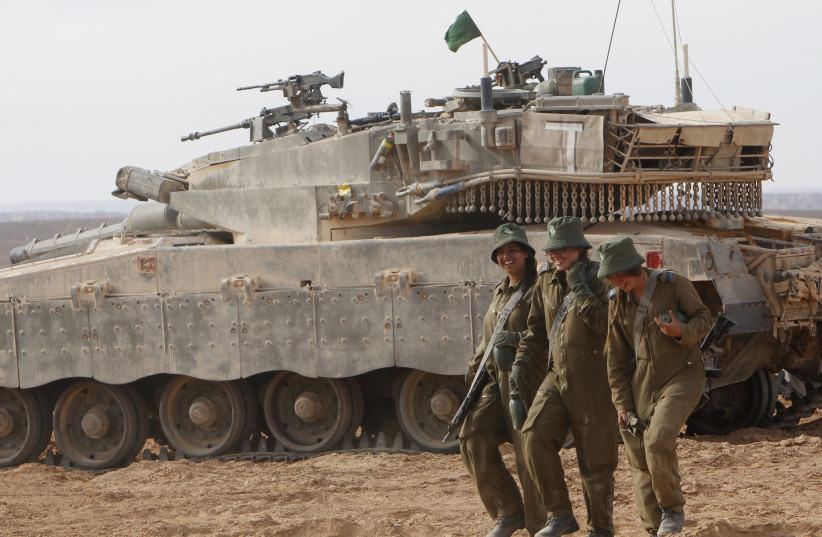As women continue to battle the military to open more combat roles in elite units, the IDF announced Tuesday they will not be able to serve in all combat units or positions, despite the opening of some additional units once closed to women.
“The Israel Defense Forces is the people’s army, which operates first and foremost professionally and in accordance with the operational requirements on the battlefield, for the realization of its mission and operational missions in defending the State of Israel, its citizens and its borders,” the IDF said in a statement.
The announcement comes as the military submitted its response to a 2018 petition to the High Court of Justice by female soldiers calling for equal opportunity to serve in frontline units.
The IDF gave its answer to the High Court along with the recommendations and conclusions of a two-year-long study regarding the petition by four teenage women who called on the High Court to force the IDF to allow all potential recruits to try out for elite units, regardless of their gender.
The committee of six men and two women studied a number of factors, including physiological and medical considerations, human-resources planning, how the women would try out for the units, how it would affect the military’s command structure going forward, how it would affect reserve service and how to have co-ed service while maintaining propriety.

The military said it was the most in-depth and comprehensive study conducted by the IDF in the past 20 years to examine each of the combat roles that had not been open to women.
The committee also analyzed the physiological characteristics of women and their ability to cope with intense physical activity like those required during combat in war and in combat events during prolonged operational missions.
“The Israel Defense Forces is the people’s army, which operates first and foremost professionally and in accordance with the operational requirements on the battlefield."
Israeli Defense Forces
To not compromise the operational requirements of combat units and due to the need to carry heavy loads of more than 40 kilograms for long distances during war, the Medical Corps formulated basic threshold physical requirements for women who want to join combat units such as Unit 669 or infantry units.
For example, women who want to serve in elite units, such as Unit 669, need to weigh at least 78 kg. and be at least 1.66 meters tall. Those who want to join combat infantry units must weigh at least 67 kg. and be at least 1.64 m. tall. Those who want to join the Armored Corps must weigh at least 60 kg. and be at least 1.65 m. tall.
Fitting the requirements
Following the recommendations of the committee, IDF Chief of Staff Lt.-Gen. Aviv Kohavi ordered that as long as a woman fits the requirements set out by the team, along with the operational requirements of the role, the position will be open to them.
The IDF officially announced two weeks ago that the IAF’s elite 669 Search and Rescue unit will be open to women, and on Tuesday it said women will also be able to serve in the Yahalom Combat Engineering Unit and mobile deployment units in the Infantry Corps.
The military said it would begin pilot programs to study women serving as sappers and in other positions in the Yahalom unit of the Combat Engineering Corps and in combat-related transportation roles in the Infantry Corps.
The military believes that there are dozens of potential female recruits who meet the physiological threshold to serve in those positions, but that are likely far fewer who would meet the requirements necessary to serve in other roles in elite combat units.
“The IDF’s mission to protect the State of Israel and to fulfill its operational missions are the leading values in examining this significant issue,” Kohavi said. “The IDF is the people’s army, and as part of that, it allows for meaningful service to everyone. But first and foremost it is committed to making professional, operational and matter-of-fact decisions.
While the petition gave the military an opportunity to examine the “complex and important” issue, serious staff work was carried out to meet all operational missions in accordance with the characteristics of the battlefield,” he said.
“The IDF staffs its ranks on the basis of professional considerations only and in accordance with the operational need on the battlefield, while making the best possible use of men and women for positions,” Kohavi said.
The most important factor in the committee’s decision was the professional considerations of the military and that they examined physiological abilities, suitability for the components of the role and maintaining the health of the fighters, since the overall injury rate for women is higher than in men, he said.
“There is an expanding responsibility for maintaining the [soldiers’ health] out of professional and moral duty,” Kohavi said, adding that “The IDF will continue to maintain its unique character as a people’s army, which is also committed to the Joint Service Ordinance.”
“The IDF staffs its ranks on the basis of professional considerations only and in accordance with the operational need on the battlefield, while making the best possible use of men and women for positions."
IDF Chief of Staff Lt.-Gen. Aviv Kohavi
The Defense Service Law says every man and woman has the right to serve in any position in the military unless the inherent nature of the position requires otherwise.
The IDF said the committee’s recommendations “will be implemented in a professional and gradual manner.”
Background
In 1949, Israel’s army became the first in the world to introduce mandatory military service for both men and women. But shortly afterward, women were barred from combat positions.
Women have fought for years to have the combat doors open once again for them. Since 2000, the IDF began to allow women into positions in combat units. The committee said it integrated the many lessons learned by the military over the years, including from the pilot program of having women in the Armored Corps, into their recommendations.
Women serve in an estimated 88% of the positions in the IDF, and the military has seen a significant increase of women drafting into units in the Navy, Home Front Command, Artillery Corps, Military Police and co-ed combat units such as the Caracal and Bardelas border-defense battalions. According to data released by the military, there has been an 18% increase in women serving in combat units.

But elite units such as Sayeret Matcal, an army commando unit that goes behind enemy lines; naval commandos Shayetet 13 and the IAF’s Shaldag special forces unit will remain closed to women, the IDF said. The IDF’s commando brigade and the Israel Navy’s Submarine Unit will also remain closed to women.
The committee said it had based its recommendations on hours of studying various medical reports and foreign militaries that have opened all combat roles to women, including the US military.
The IDF stressed that the recommendations by the committee were based solely on professional and physiological requirements, but critics of gender integration in the military say it is a dangerous social experiment with potential ramifications for national security as requirements for female combat troops have been lowered as women tend to suffer from stress injuries at a higher rate than men.
Rabbis have also criticized the integration of women into combat positions and several cases in which officers have taken excessively strict interpretations of rules so religious male soldiers can be comfortable.
